The Flight That Changed Everything
Leaving Trinidad wasn’t just another travel day; it felt like the closing of a whole chapter of my life.
I was calm right up until I handed over my suitcases at check-in. The second those bags disappeared down the belt, so did my sense of control. My chest tightened, and the reality of what I was doing hit me—hard. I was moving halfway across the world, alone, with no real blueprint, just faith that it was time to evolve. For a moment, I could feel the tears coming, but I swallowed them back. It wasn’t fear exactly; it was the weight of stepping into the unknown.
When the plane finally lifted off, that four-hour flight to Miami felt endless. No music, no distractions, just silence and a head full of questions: What if this doesn’t work? What if I’m making the biggest mistake of my life?
For the first time in a long time, I sat with my thoughts without trying to drown them out. It was uncomfortable—but honest.
Everything shifted during my layover in Miami. I called a friend, and we stayed on the phone for almost five hours, just talking life. It grounded me again. And then I saw them— the Qatar Airways crew walking through the terminal like a synchronized statement of excellence. Immaculate uniforms, perfect posture, calm precision. Everyone’s eyes followed them. In that moment, something clicked.
It wasn’t about airlines or appearances—it was about standards. The way they carried themselves spoke to an environment where excellence wasn’t optional, it was culture.
And that’s when I knew: I was heading to the part of the world that was doing things differently—cleaner, sharper, more intentional.
Boarding that Qatar flight felt like crossing a threshold. The service, the order, the architecture of Doha when we landed—it all whispered the same message: you’re exactly where you’re supposed to be.
By the time I touched down in Thailand, the fear was gone. What replaced it was quiet excitement—the sense that I had placed myself right in the middle of the best classroom in the world. The lesson? Growth begins the moment you let go of certainty.
First Impressions — The City That Never Yells
The first thing that struck me about Bangkok wasn’t the lights, the traffic, or the sheer size of the city—it was the silence.
Not the kind of silence you get in a quiet room, but a collective calm that somehow existed within chaos. Cars moved, people flowed, lights flickered, yet the city never raised its voice.
Back in Trinidad or even Canada, life always had a soundtrack—horns blaring, music pumping from cars, loud conversations spilling into the street. Energy everywhere, but always loud.
Bangkok moved differently. It had the energy of New York, but the composure of a monastery. You could feel millions of people going about their day, yet somehow, peace hung in the air.
I was staying around the Lumpinee area, and one of the first things I did was take a walk through the neighborhood. Skyscrapers glowed above street food stalls, monks walked beside businessmen, and the scent of grilled meat mixed with incense from nearby shrines. It was surreal.
Everyone seemed to move with intention—no rushing, no posturing, no noise for the sake of being seen.
And then, like a scene from a documentary, I walked into Lumpinee Park. I’d heard about the Water Monitors that lived there, massive lizards that roam freely through the park, so I went looking for one. I expected to have to search—but within minutes, one casually strolled across the sidewalk, unbothered by the people around it.
That moment made me laugh out loud. It was a sign—nature and city coexisting, chaos and calm blending. In that instant, I felt my body unclench for the first time in a long time.
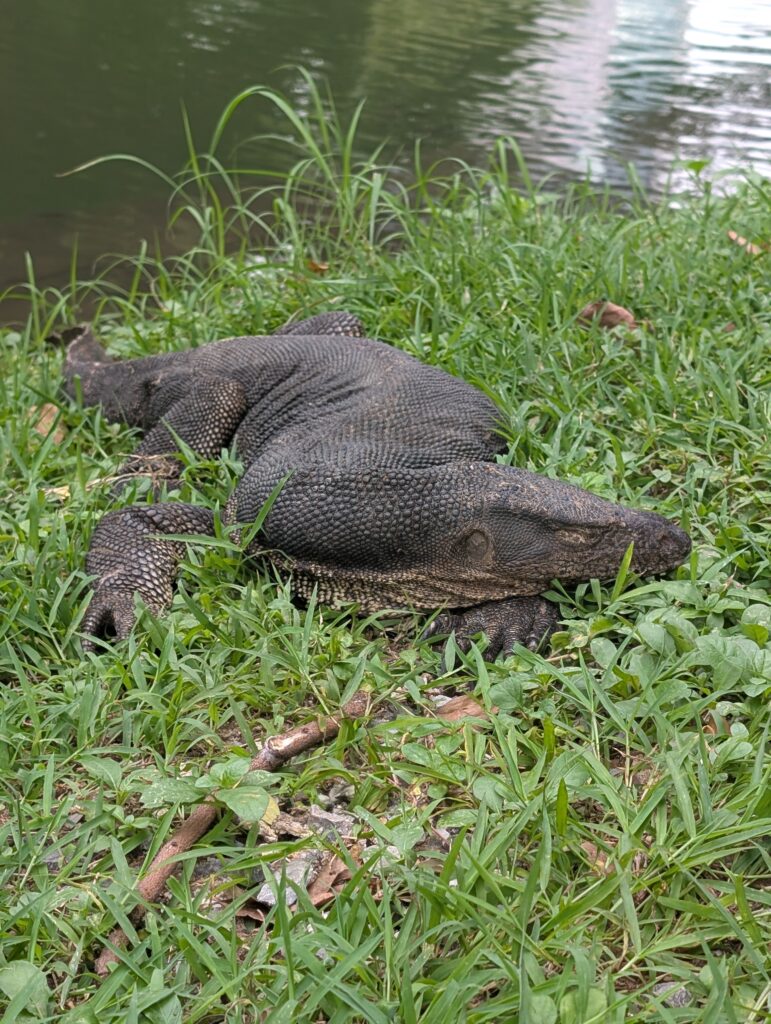
I spent hours in that park that day. Watching people run, practice Tai Chi, feed fish in the lake. Nobody seemed in a rush to be anywhere else.
And for the first time in years, neither was I.
The next day, I found my condo. The process took one day—simple, smooth, efficient. No endless paperwork, no stress. By the following morning, I was moved in, unpacking my bags, and realizing… this was it.
No more countdowns, no more transitions. I wasn’t visiting anymore—I lived here.
That thought didn’t scare me. It grounded me.
There’s something sacred about the first moment a place feels like home. For me, it wasn’t when I signed the lease—it was that quiet walk in Lumpinee Park, where I stopped trying to arrive and just let myself be.
Building a New Rhythm — Freedom by Design
The first month in Thailand was about observing—learning the flow of the city, understanding what everything cost, figuring out what felt natural.
Once I understood that the cost of living here was a fraction of what I was used to, something inside me loosened. For the first time in years, I wasn’t chasing the next invoice or the next project just to keep the lights on. I could finally exhale and ask myself: How do I actually want my days to feel?
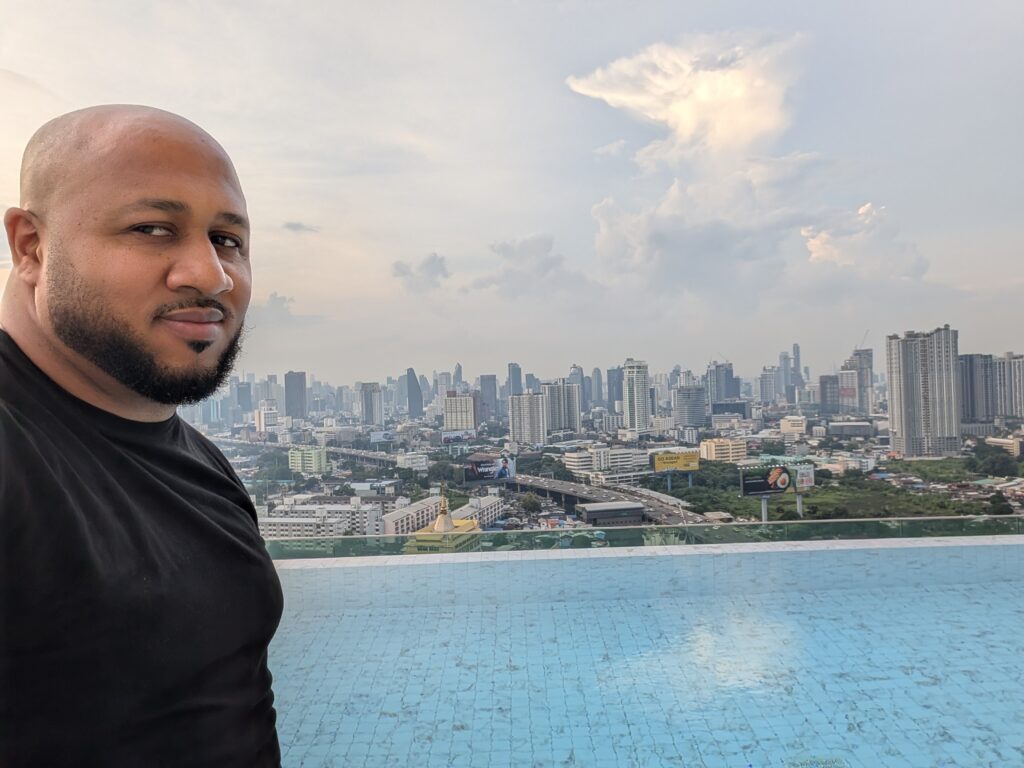
So I built a rhythm around peace instead of pressure.
Because my clients and audience are mostly in the Caribbean and North America, I had to get creative with time zones. I mapped out my work hours to line up with theirs—working until noon AST (which is 11 p.m. for me in Bangkok), and again early in the morning around 4 a.m. Thai time. That way, my meetings and deliverables always landed during their daytime.
It sounded intense at first—waking up at 4 a.m.—but strangely, I loved it. The city is quiet then. I can hear the birds outside my balcony, the faint hum of scooters in the distance. There’s no noise, no emails flooding in yet. Just stillness and focus.
By 8 a.m., when the rest of the world is winding down, my day is just beginning.
I eat breakfast slowly, walk to the gym around 11 a.m.—a solid 25-minute walk each way that’s become a kind of moving meditation. By the time I get back home around 1 p.m., the sun is high, my body is awake, and my head is clear. I make lunch, shower, maybe nap for an hour or two, and by 5 p.m., I’m ready for my next work block.
No two days are identical, but they all orbit around that same intention: don’t rush, don’t overload, don’t say yes out of fear.
The lower cost of living gave me the luxury of discernment. Back in Trinidad, I sometimes accepted projects that didn’t excite me simply because I couldn’t afford to turn them down. Here, I can say no to anything that doesn’t align—and that “no” feels like wealth.
What surprised me most is how much better I sleep now. My body isn’t fighting anxiety anymore. I don’t wake up thinking of deadlines—I wake up thinking about what I want to create.
This new rhythm also created space for my travels. Every two months or so, I find myself somewhere new—Phuket, Bali Vietnam, China. Sometimes for work, sometimes just to recharge. Those breaks don’t derail my routine; they’re built into it.
Even my views on money changed. I realized that if I’m gone half the time, I don’t need an expensive condo sitting empty. Moving into a smaller, cheaper place later on wasn’t a downgrade—it was strategy. Every dollar saved extends my runway, funds my next trip, or fuels my business experiments.
It’s what people in the digital-nomad world call geo-arbitrage—but for me, it’s just common sense. Spend less, live better, think clearer.
Thailand gave me the room to design a life that fits me.
Not a schedule, not a hustle, not someone else’s version of success—just my own rhythm, steady and intentional.
The Power of Lower Costs — Buying Back My Time
When people think about moving abroad, they usually picture tropical beaches, new cuisines, and cheaper rent.
But for me, the most life-changing thing about Thailand wasn’t the scenery — it was the math.
The cost of living here doesn’t just stretch your money.
It stretches your peace of mind.
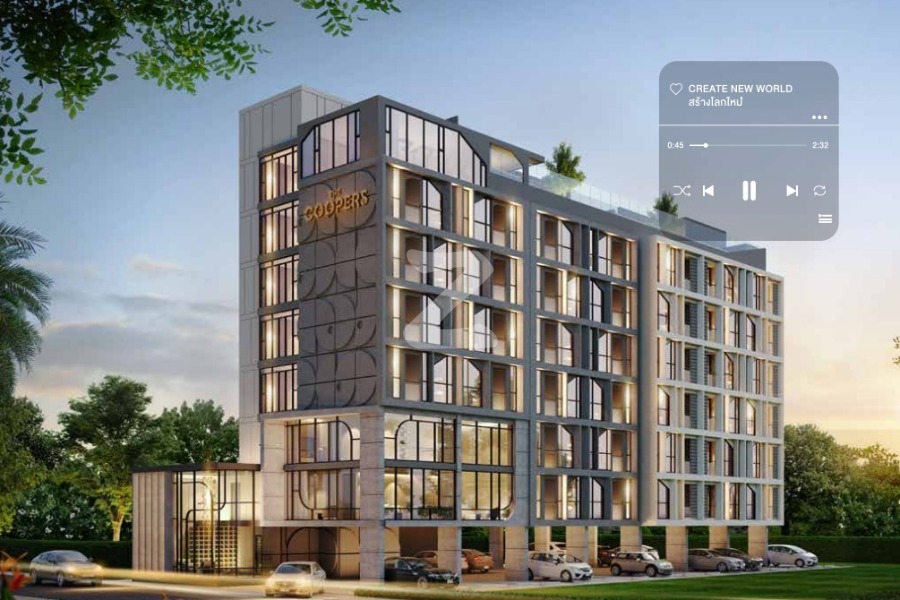
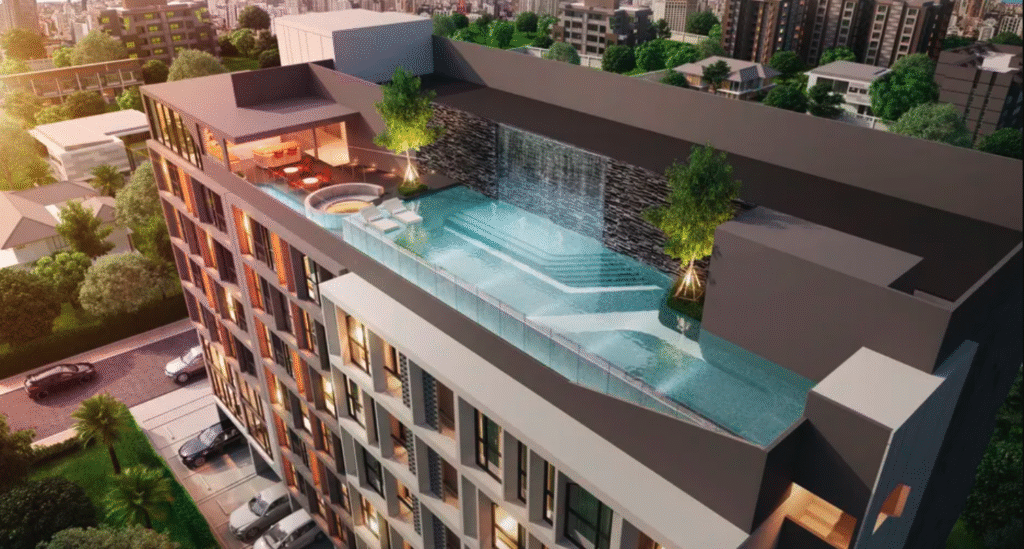
Let me break it down.
- Rent: $400 USD/month — I live in a brand new condo, full amenities: pool, onsen, gym, co-working space (with free coffee and snacks), theater and game room, plus a free shuttle to the BTS station or a 5-minute walk. Walking distance to 2 malls and major business ecosystems in True Digital Park & Cloud 11.
- Electricity: $10–40 USD/month
- Water: $1.50 USD/month
- 5G Cellphone Plan: $19 USD/month
- Home Internet: $19 USD/month
- Food (groceries + dining out): $300–400 USD/month
Even on my most expensive months, everything — rent, utilities, internet, gym access, massages, food, transportation — comes up to roughly $900 USD total.
Back in Trinidad, I was spending $1,000 USD on food alone every month.
Just food.
“In Trinidad, $1,000 kept me fed. In Thailand, it funds my entire life.”
That realization changed everything. It wasn’t about living “cheap.” It was about buying back my time, freedom, and clarity.
Because my cost of survival dropped, I no longer had to say yes to every project. I could slow down, breathe, and only take on the work that felt aligned. That’s a luxury most entrepreneurs never experience — not because they can’t earn more, but because their environments never give them the space to need less.
Now, my days include things I used to feel guilty about — two-hour workouts, long walks, naps in the middle of the afternoon, unhurried lunches. And when I need to decompress, massages are everywhere. My daily spa offers a 2-hour oil massage for $18 USD, and even basic ones start around $8 USD.
This lifestyle has reshaped my health. I started the year at 250 lbs, the heaviest I’d ever been. As of now, I’m 205 lbs — lighter, stronger, and clearer. When my body feels off, I fix it immediately instead of pushing through it.
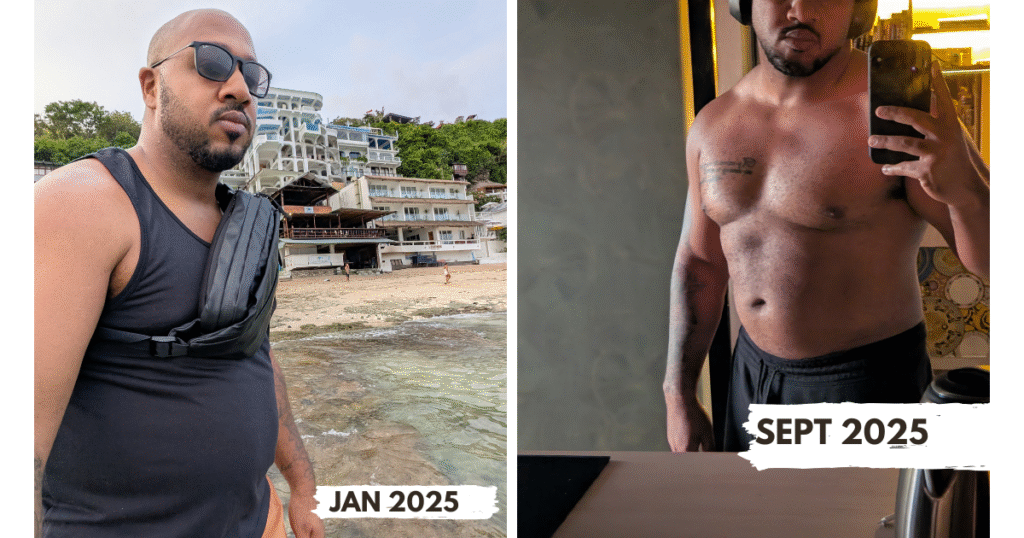
And when I crave a change of scenery?
A flight to Phuket costs $40 USD.
A bus to Chiang Mai costs $20 USD with Wi-Fi the whole way.
Suddenly, weekend getaways and new adventures are part of regular life, not a financial event.
“I didn’t move to Thailand to live cheap. I moved here to live free.”
Every decision, every dollar, and every day now adds up differently.
This isn’t about earning more — it’s about earning back my life.
Thailand didn’t just lower my expenses.
It raised my standard of living.
Transformation — Rebuilding the Self
If Year One had a theme, it would be detox.
Not just from the places I left behind, but from the version of myself that was always in survival mode — the man who thought rest was laziness, who felt guilty for not constantly producing, who measured worth in output instead of peace.
I spent the first 37 years of my life in North America and the Caribbean — two environments that are beautiful in culture but heavy in pace.
In Canada, it was endless grind culture; in Trinidad, it was daily stress layered with economic pressure, bureaucracy, and instability.
You learn to live tense. You don’t even notice it until your body finally relaxes somewhere else.
“Thailand didn’t just change my address — it changed my nervous system.”
Here, I found space to breathe, reflect, and rebuild from the inside out.
I stopped needing people to understand me or my choices. Everyone sees life through their own fears, traumas, and limitations — I stopped trying to fit inside that lens.
That alone was freedom.
But this move wasn’t just for me. It quietly reshaped my family too.
My brother has already visited twice — he’s 27, and Thailand has opened his eyes to a different way of living earlier than I ever did. My mom arrives soon; she’s always the first to hop on a plane wherever I go. And my kids — they’re the real legacy of this decision.
My daughter, 17, is deep into anime and Japanese culture. Now that I’m in Asia, she’s seriously considering studying in Japan — an idea her mother would’ve never entertained before. My 10-year-old son is constantly researching Thailand and sending me random facts about it. He’s curious about the world in a way I never was at his age.
That’s the part that gets me most.
Yes, I miss them. But I know that my leap expanded their sense of what’s possible. I didn’t just move for myself — I opened a door they didn’t even know existed.
“Sometimes breaking away from home is how you build new homes for others.”
This journey also shifted my mission.
For years, my work in the Caribbean focused on teaching people how to navigate the digital space — helping them build websites, learn marketing, start online businesses. I taught what I’d learned through trial and error, trying to help people avoid the pitfalls I faced.
But it kept me thinking small — always trying to fix a system that wasn’t evolving fast enough.
Now, my perspective is global. I’m not looking at the Caribbean to solve its own problems anymore. I’m looking outward — studying Asia’s digital ecosystems, seeing how innovation actually works when infrastructure, government, and people move in sync.
My role now is to bridge worlds — to show the Caribbean what’s possible, what’s being done, what we can model and adapt.
It’s not about complaining that we’re behind — it’s about exposing us to what the future already looks like elsewhere.
Living here reminded me that I’m not just a digital strategist.
I’m a translator between worlds — between where I come from and where the world is going.
Community & Energy — The Peace Seekers
When I first got to Thailand, I didn’t come looking for community.
I came looking for clarity.
But one of the unexpected gifts of this new life has been the people I’ve met along the way — a mosaic of dreamers, builders, and quiet rebels from every corner of the world.
I’ve met people from France, Belgium, Italy, Ukraine, the U.S., Thailand — all of us from different backgrounds, yet somehow, the same story keeps repeating itself.
Everyone left their home country for similar reasons: cost of living too high, quality of life too low, too much fear, too much noise.
We all wanted a life that felt good — not one that just looked good.
“We weren’t running away from home — we were running toward peace.”
It doesn’t matter whether they’re in their twenties figuring it out, in their thirties rebuilding, or in their fifties finally slowing down.
Every person I’ve met here shares that same underlying truth: at some point, you have to choose your own rhythm over the one the world handed you.
What I love most is how normal it feels here to start over.
Back in the Caribbean, or even in Canada, reinvention often comes with judgment. People want to label your choices before they understand them. Here, nobody blinks if you say, “I quit my job to start fresh.” They’ll probably smile, nod, and tell you about their own version of the story.
It’s a beautiful exchange of courage — people from every continent who took different paths but landed in the same place of surrender and discovery.
We meet in cafés, co-working spaces, gyms, or random markets, and before you know it, someone from Italy is helping someone from Colombia with a visa question, or a Thai friend is explaining a Buddhist festival you’ve never heard of.
It’s a subtle reminder that community isn’t always built through shared history — sometimes it’s built through shared frequency.
Even when I travel — to Vietnam, Bali, Cambodia, or China — I find the same energy echoing back. People moving slower, smiling more, grateful that they chose something different.
“Everywhere I go, I meet versions of myself who had the courage to start over.”
This circle of global thinkers has reinforced something I already knew deep down: I’m exactly where I’m supposed to be.
Surrounded by people chasing peace over prestige, simplicity over status, and experience over possessions.
These are the real digital nomads — not the ones chasing Wi-Fi and cocktails, but the ones quietly rebuilding their lives around intention.
Work & Flow — Lessons from the Digital Nomad Life
If there’s one thing the digital nomad life has taught me, it’s that freedom without structure quickly turns into chaos.
You have to design your own rhythm — otherwise, you end up working everywhere and resting nowhere.
When I first moved to Thailand, I realized I had to figure out my work schedule immediately.
With my clients and audience mostly in the Caribbean and North America, my life became a time-zone equation. Once I nailed that, everything else fell into place.
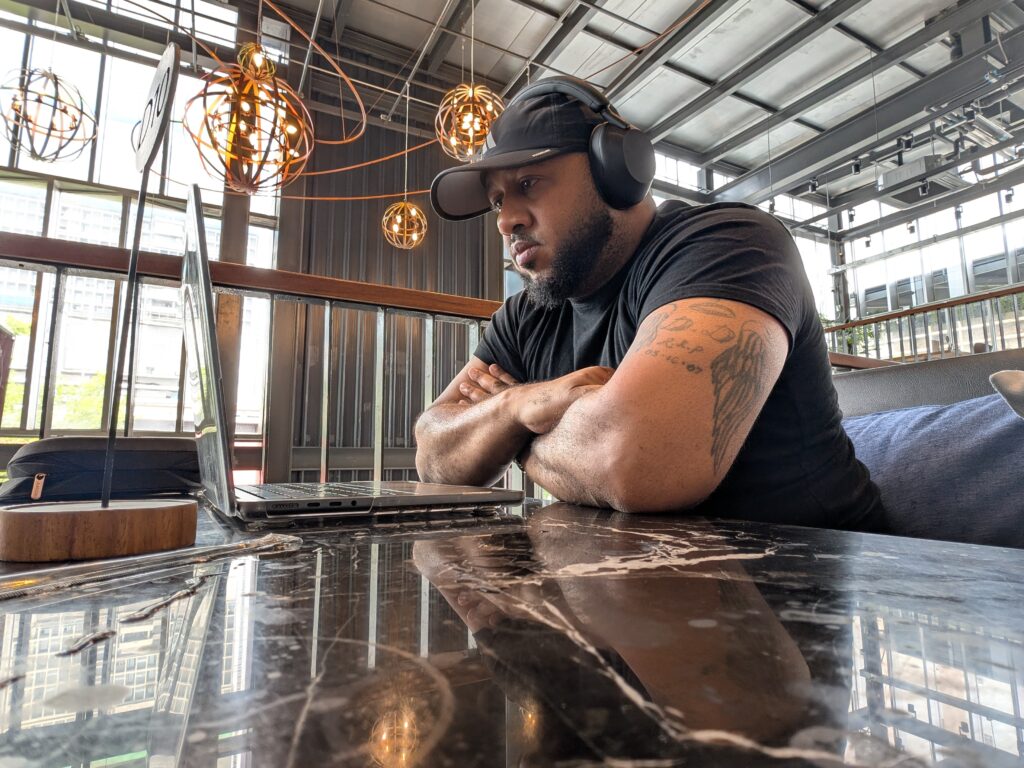
But there’s another layer that most people don’t talk about: budgeting and boundaries.
“The first step to freedom is knowing your real cost of peace.”
Living abroad gives you infinite options — condos with rooftop pools, café workdays, constant travel — and that can become a trap if you’re not careful.
I learned early on that trying to “impress” people with lifestyle choices is a fast way to go broke.
I could’ve rented the flashier condos, lived in the influencer version of Bangkok, or tried to keep up with the expat crowd that treats every night like a highlight reel. But I didn’t move across the world to keep performing.
I came here to live intentionally — comfortably, sustainably, and on my own terms.
Setting a clear budget changed everything.
Once I understood what I actually needed to live well — not survive, not stunt — I realized how little it takes to sustain happiness.
That number became my anchor. It told me how much I truly needed to earn every month to keep my life running smoothly.
And once I had that number, I started saying “no” more often.
I don’t chase opportunities anymore; I curate them.
If something doesn’t align with my values, energy, or creative direction, I pass. That kind of restraint feels like wealth in itself.
“Freedom isn’t about doing everything you can. It’s about not needing to.”
That mindset has made me a better entrepreneur. My decisions are sharper, my creativity stronger, and my mental health steady.
Because my life isn’t built around more — it’s built around enough.
The digital nomad life isn’t an escape from work; it’s a redefinition of it.
Work still exists — but now it lives in harmony with the things that make me feel alive. Gym. Travel. Nature. Slow mornings. Good food. Conversations that matter.
Living this way has taught me that balance isn’t found; it’s engineered.
And that’s been the biggest lesson so far — the discipline behind the freedom.
The Forex Friction — Living Global, Banking Local
For all the peace and balance Thailand has brought into my life, there’s one frustration that follows me everywhere — and it doesn’t come from here.
It comes from Trinidad.
No matter how digital my business gets or how global my mindset becomes, I’m still tied to a banking system that feels stuck in time.
My Republic Bank credit card has a USD $2,500 limit, but that doesn’t mean I can actually use it when I need to. Online payments might go through, but trying to withdraw cash at an ATM or pay in-store? That’s a 50/50 gamble.
When issues come up, getting support from abroad is another story.
Emails go unanswered for weeks, chat systems never work, and I end up calling a friend back home just so they can three-way the bank for me on WhatsApp. It’s a ridiculous process for something as basic as accessing my own money.
The bigger challenge, though, is forex — or more accurately, the lack of it.
In Trinidad and Tobago, foreign exchange is scarce, heavily restricted, and tightly controlled by the banks.
For anyone earning in TTD but spending in USD, it’s a daily game of limits and luck.
So I had to figure out workarounds.
I started using tools like Wise, PayPal, and Zelle to move money more fluidly. Sometimes I’ll send TTD to a friend in Trinidad, and they’ll Zelle me the USD equivalent — small hacks that keep me operational when the official system fails.
Eventually, I made a bigger shift.
I focused my business on earning internationally — clients who pay me directly in USD, routed through Wise or Bank of America. No restrictions, no approvals, no begging a teller to “release” my own funds.
That’s when it clicked for me:
you can’t live a borderless life with borders on your bank account.
The irony is that this limitation — this constant friction — became one of my greatest teachers.
It forced me to think global, to structure my business in ways that no longer depend on systems designed for smallness.
“The system forced me to become global — and honestly, that’s the best thing that ever happened.”
I stopped waiting for banks or governments to catch up.
I built my own infrastructure instead.
And that’s when true freedom began — not the kind you post about, but the kind that lets you move, earn, and build from anywhere in the world, on your own terms.
*You can read the full article here with all of my resources on how I’ve been navigating the Forex Crisis in Trinidad and Tobago —> How I navigate Trinidad’s Forex crisis.
Everyday Joys — Small Luxuries, Big Gratitude
It’s funny how quickly you start to appreciate the smallest things when you live in a place that gives you space to breathe.
I used to chase milestones — now I pay attention to moments.
One of my favorite parts of the day is the walk to the gym.
Twenty-five minutes each way under Bangkok’s morning sun, passing street vendors setting up shop, coffee stalls steaming in the air, and the hum of motorbikes weaving through traffic.
That walk has become a meditation — a daily reminder that progress doesn’t always need to be fast to be real.
The gym itself has become my anchor. Back in Trinidad, I’d always tell myself, “If the gym isn’t five minutes away, I won’t go consistently.”
Now, I walk nearly an hour round-trip every day — and I love it.
My health transformation didn’t come from some miracle routine; it came from routine itself.
It came from finally having the energy, time, and peace of mind to focus on my body instead of my bills.
And when I’m sore — which is often — I know I can walk down the street and get a two-hour oil massage for about $18 USD. That simple act of care is something I never took for granted.
It’s not indulgence; it’s maintenance.
The same goes for travel.
Flights and buss rides across Thailand are cheaper than a dinner out in Toronto — $40 USD to Phuket, $20 USD to Chiang Mai.
And what still blows my mind is that each place feels like an entirely different world: the calm of the islands, the mountains of the north, the energy of the capital.
I don’t need to wait for a vacation — I live in one.
Sometimes I’ll wake up, crave the sea, and just book a same-day ticket to Phuket.
No overthinking, no planning — just movement.
That level of spontaneity used to feel impossible. Now it feels normal.
What I’ve realized is that joy doesn’t come from having more — it comes from having enough.
Enough to move when you want.
Enough to rest when you need.
Enough to say no without fear.
The balance I have now — the blend of structure, spontaneity, and serenity — is exactly what I was searching for all along.
And the beauty of it all is how ordinary it feels.
It’s not luxury that makes this life rich — it’s the peace that comes with living it intentionally.
Creative Rebirth — Living in the Future
Living in Asia has completely rewired how I see the world — and what’s possible.
Every day feels like a glimpse into the future, especially when you come from regions that are still fighting for digital basics.
In Thailand, even the small businesses are digital-first.
Street vendors accept PromptPay. Taxi drivers scan QR codes. People in their seventies and eighties walk up to ATMs, tap their phones to log in, and navigate mobile banking like pros.
It’s not about age or access — it’s culture.
Everywhere I go, the systems work.
Payments, transport, delivery, logistics — all seamless. And when you live in an environment that’s this efficient, your creativity starts to expand. You stop thinking about “what’s wrong” and start thinking about “what’s next.”
It’s one of the main reasons I spend time at places like True Digital Park or Cloud 11 — hubs where startups, global tech companies, and creators all collide. You feel the innovation in the air. People are building the future, not talking about it.
Conferences on AI, robotics, sustainability, e-commerce — every week there’s something new to learn.
“Asia isn’t waiting for the future. It’s already building it.”
That energy fuels me.
It’s made me realize that my role isn’t just to build a personal brand — it’s to be a bridge.
For years, my mission was to help Caribbean entrepreneurs get online — to show them how to build websites, sell digitally, and market themselves. And while that’s still a part of what I do, I’ve outgrown that lane.
Now, I’m focused on connecting the dots — bringing global insights back home and showing people that the Caribbean doesn’t have to wait for the world to catch up.
We can learn from what’s already working in Asia.
The banking systems.
The digital payments.
The efficiency.
The infrastructure.
All of these things are examples of what happens when governments, businesses, and citizens embrace innovation together.
This shift in environment has changed my output completely.
My content now reflects what I live daily — stories from Thailand, lessons from China, experiences from conferences, and insights that open people’s eyes to what’s possible.
It’s not theory anymore. It’s lived experience.
I’m not reposting viral clips of innovation; I’m standing inside them.
And that perspective has reignited my creativity.
It’s not about chasing trends — it’s about translating vision.
Living here has reminded me that creativity isn’t about thinking outside the box.
It’s about realizing the box was never real to begin with.
Looking Back — Talking to My Past Self
Every now and then, I think back to that day at Piarco Airport — the moment I handed over my bags, fighting the urge to cry, pretending to be composed while my chest felt like it was closing in.
That version of me was scared but determined. He didn’t have all the answers; he just knew he couldn’t keep living the same story.
If I could talk to him now — one year later — I wouldn’t give him a speech.
I’d just look him in the eye, smirk, and say, “We gucci, bro. Get on that plane.”
Because truthfully, that was my inner child showing up — nervous, excited, stepping into another unknown.
When I moved to Trinidad years ago, I had family waiting for me. It was familiar, safe.
Thailand was different. It was a complete leap into the unfamiliar — no guarantees, no comfort zone, no blueprint.
But that’s what made it sacred.
Sometimes life doesn’t give you a map because you’re meant to draw your own.
That’s what this year taught me.
I look back at that man at the gate, and I feel nothing but gratitude for him.
He didn’t let fear win. He didn’t wait for perfect timing. He trusted the pull — even when logic said stay.
“The unknown didn’t destroy me. It revealed me.”
This version of me — grounded, lighter, healthier, more intentional — only exists because he chose to walk through that fear.
Because he got on that plane.
And now, I know that every new chapter of my life will begin the same way — with a little uncertainty, a deep breath, and a quiet promise to keep going anyway.
Looking Ahead — Year Two Intentions
If Year One was about detox, Year Two is about expansion.
The first year stripped away everything that wasn’t essential — the noise, the guilt, the constant pressure to prove something.
Now, I’m moving into a season of building, exploring, and experimenting again — but from a place of balance, not burnout.
I recently moved into a new condo and dropped my rent from $640 USD to $400 USD. That decision wasn’t about cutting costs — it was about deepening freedom.
The less I spend to live well, the more space I create to live fully.
That’s geo-arbitrage in real time — the ability to adjust your environment so it serves your life, not the other way around.
This year, I want to push my body and my business in new ways.
I’m signing up for Muay Thai, not to become a fighter, but to learn more about discipline, focus, and presence. I’ve realized that the body teaches lessons the mind often resists — and Thailand, with its deep culture of movement and mastery, feels like the perfect place to learn.
Creatively, I want to keep exploring new ways to merge storytelling, strategy, and digital innovation.
There’s a new business idea on the horizon — something experimental, something that could reshape how I and my audience think about digital entrepreneurship in this region.
It’s too early to define, but that’s what makes it exciting.
More travel is also on the agenda — new cities, new countries, new perspectives.
There’s a different kind of education that comes from seeing how other societies operate, how they integrate technology, culture, and community.
And every trip brings new ideas I can share with the Caribbean, helping people rethink what’s possible when you start building beyond borders.
I definitely want to spend more time in China as their is so much learn and offer, especially when it comes to the business side of things.
“Year One was about finding peace. Year Two is about testing the edges of it.”
This next chapter isn’t about more — it’s about depth.
I’ve learned that peace isn’t a final destination; it’s the foundation you build on.
So, I’m entering this next year curious, grounded, and ready to evolve again — not because I’m chasing change, but because I’m finally stable enough to welcome it.
The Noise — Navigating Negativity and Naysayers
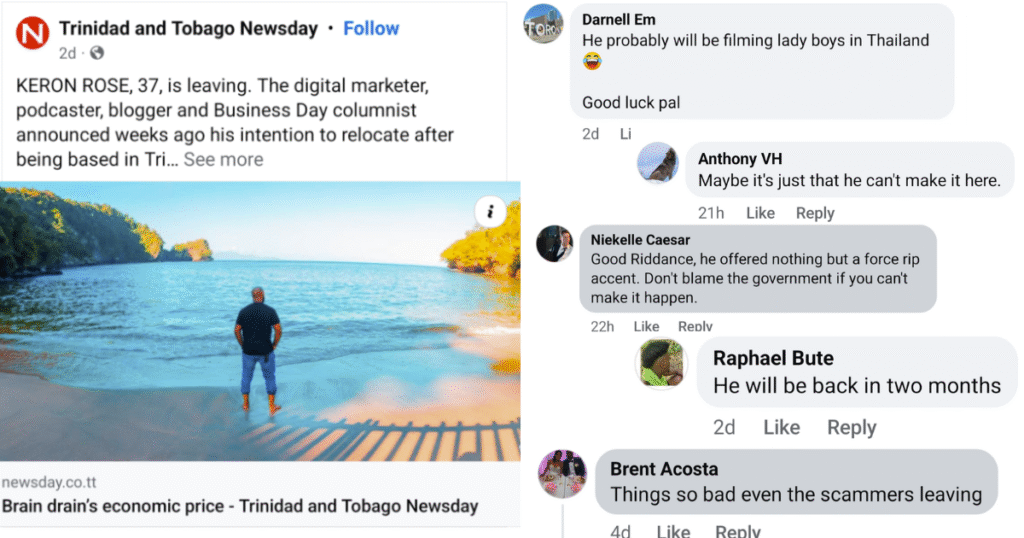
When the article about me moving to Thailand came out, most people celebrated the move.
But then there were the comments — the ones dripping with sarcasm, projection, and insecurity.
Strangers with zero context about my journey were suddenly experts on my life.
Some said I couldn’t make it here.
Some tried to paint me as a scammer.
Others made lazy jokes about Thailand, or about me personally — all without knowing a single fact.
At first, I was confused. I didn’t understand how people who had never met me could have so much to say about a move that had nothing to do with them.
But after a few minutes, it clicked — this isn’t about me.
It’s about what my move represents.
When you decide to step out of the box that society built for you, it triggers something in people who never believed they could do the same.
Your freedom mirrors their fear.
Your courage confronts their comfort.
“People don’t hate you. They hate what your life says about the choices they didn’t make.”
I’ve had dozens of people reach out privately since then — saying that they’ve wanted to make similar moves, but it’s the negativity from their own family and friends that’s kept them stuck.
It’s heartbreaking, but it’s real.
Words have power, and too many people let the noise drown out their intuition.
The truth is, everyone sees through their own lens — and most lenses are scratched by trauma, insecurity, and fear.
So I stopped taking offense.
I learned to take inventory instead.
Those who understand my mission — they’ll come closer.
Those who don’t — they’ll talk.
And both reactions are useful data.
Because the minute you stop living for other people’s approval, you start living with purpose.
And the irony is — when it finally works out, those same people who doubted you will be the first ones asking, “How did you do it?”
The moment your life becomes proof that better is possible, you stop being “relatable” to people committed to mediocrity.
So if you’re reading this and struggling with fear or judgment, let me say this clearly:
You’re not crazy for wanting more.
You’re not selfish for choosing peace.
You’re not arrogant for wanting to see the world.
You’re just waking up.
And once you start living awake, no one asleep can understand you — at least, not yet.
Closing Reflections — The New Digital Nomad
When I first moved to Thailand, I thought I was just changing locations.
Now I realize I was changing frequency.
The man who left Trinidad was chasing peace; the one writing this today is living it.
And that’s the biggest shift — understanding that peace doesn’t come from what you run away from, but from what you choose to build toward.
A lot of people still hear the term “digital nomad” and think it means constant travel, always on the move, laptop on a beach somewhere.
But that’s the old definition.
The new digital nomad has a home base.
We build routines, communities, and consistency — but our lives remain portable.
We’re rooted, but never stuck.
For me, that’s what freedom looks like now — the ability to choose my environment, control my time, and create work that aligns with who I am becoming.
It’s not about escaping responsibility; it’s about designing life with intention.
The future is digital.
It’s borderless, skill-driven, and wide open for those willing to adapt.
That’s the message I keep sharing — not as theory, but as lived experience.
If you can learn a digital skill, you can build a life that travels with you.
Your income, your opportunities, your creativity — all of it can move with you through every season of life.
And the beauty is, it’s not reserved for a few.
You don’t need to be rich or special to start.
You just need to be curious enough to explore and disciplined enough to sustain it.
I’ve said it before, but it bears repeating — it’s not about living cheap; it’s about living free.
Thailand gave me that lesson every day.
It taught me that joy isn’t in luxury, but in rhythm.
It’s in waking up calm, walking to the gym, building something meaningful, and still having space left over to breathe.
The digital nomad life isn’t about perfection. It’s about permission — permission to live differently, to trust your instincts, to build a life that actually feels good.
And if you’re on the fence, wondering whether you should take the leap — whether you should start that business, learn that skill, or move somewhere new — here’s my honest advice:
You only get one life.
Make it an experiment worth running.
Because the truth is simple —
you are worth it.
If you want more info on making the move to Thailand yourself, you can check out this article I put together –> How To Migrate To Thailand From The Caribbean.
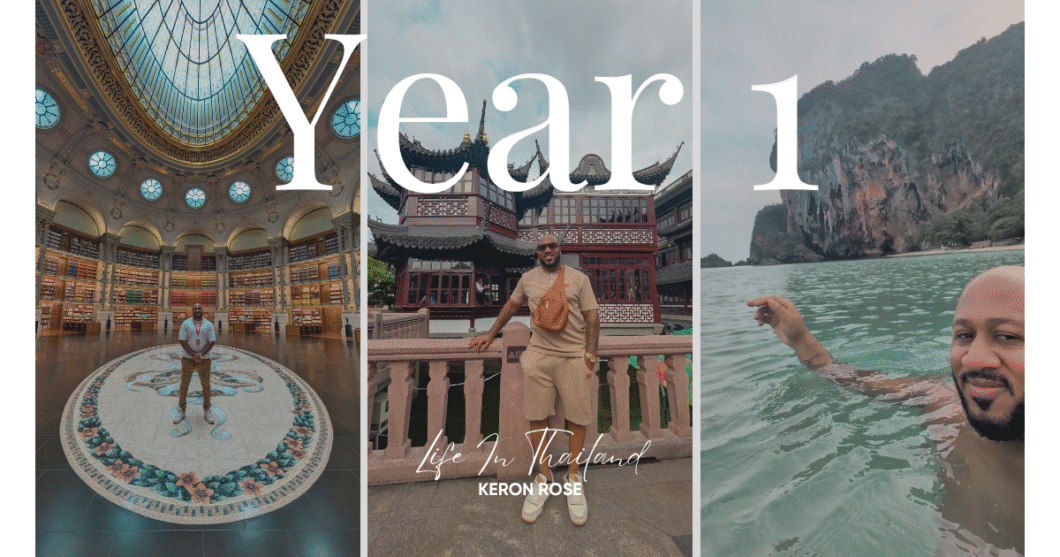
Always inspirational. My next move will be far away from what I know to the unknown…just because living is possible!
Thanks Keron and congratus on 1 down many more to go!
This was a beautiful and peaceful read! I just completed one of your classes over the weekend and in addition to the valuable information shared, your insights on your move to Thailand had me intrigued, since I’ve realized that I have no reason to live in Trinidad anymore, everything is so problematic and I’ve always been an avid traveler, but to move officially is a big deal in comparison to a mere 2-6wks out of home. This is a forever and ever type move. Thank you for your inspiration and well written blog. Looking forward to more in the future. Much continued success, peace, joy and blessing on your journey.